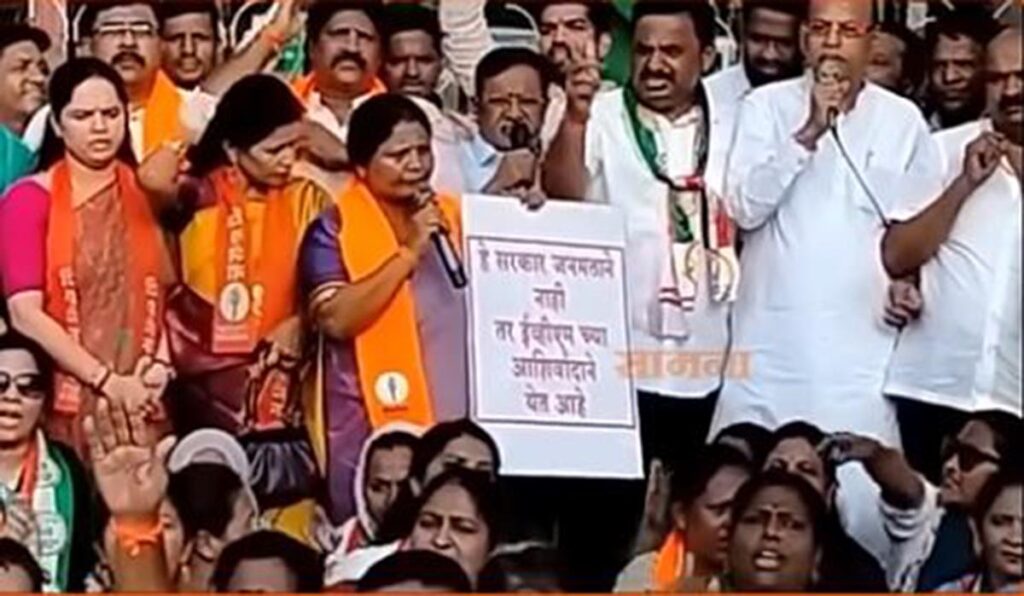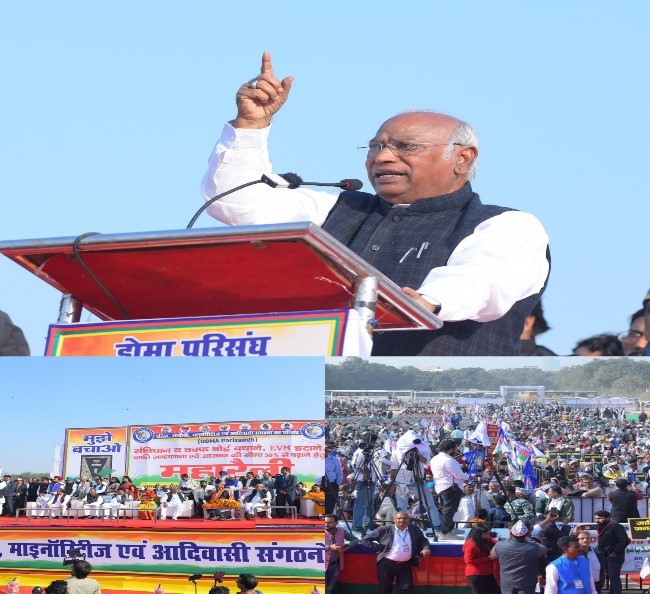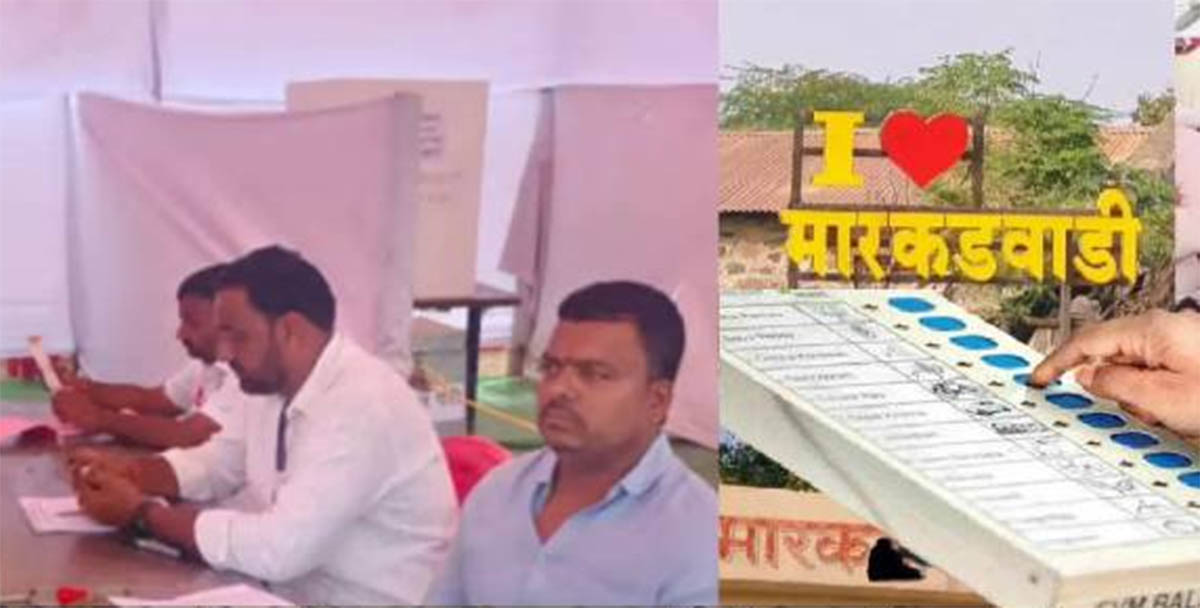From a village in Sholapur district of western Maharashtra, Markadwadi, determined to carry out a mock poll challenging what voters believed to be miscalculations in the EVMs to a more widespread dissatisfaction at the ECI-conducted state assembly polls (allegations of manipulations range from illegal deletions in Voters list, to questionable additions and a shocking surge in voting percentages after close of poll on November 20), protests have dotted the Maharashtra landscape ever since the declaration of results on November 23. Yesterday, the day of the Maha Yuti government’s swearing in, Pune, Sholapur and Akola saw widespread protests against what agitators called a “manipulated and fixed election.”
On November 23, the results of the Maharashtra state assembly elections, which covered 288 constituencies across 36 districts, were declared. With the BJP unexpectedly sweeping the polls, the local media and social media was rife with stories of “manipulations.” Dissatisfied with the EVM counting process, in the small village of Markadwadi in Malshiras taluka, Solapur district, a wave of dissatisfaction followed the outcome of the election result. Villagers, especially in Markadwadi, were upset over the election results, particularly regarding the outcome of the Malshiras seat. While NCP (SP) candidate Uttamrao Jankar won the seat with a margin of 13,147 votes, Markadwadi villagers were shocked by the voting numbers in their village booth. Jankar secured only 843 votes in the village, while BJP’s Ram Satpute received 1,003—an outcome many found unlikely given the area’s historical support for Jankar.
Markadwadi, a village with a population of approximately 2,000, saw 1,900 of its residents cast their votes in the assembly elections. According to the villagers, the results at the booth level seem implausible, as they are all strong supporters of Jankar. They argue that Satpute, who has typically received 200-300 votes in the past, could not have gained a significant lead from their village.
Sabrangindia has been regularly bringing its leaders updates of the issues raised in various constituencies after the declaration of results. These may be read here and here.
Villagers decided to hold a “repoll” with ballot paper on December 3, large police contingent imposes curfew, books 200 villages in criminal cases.
As an expression of their dissatisfaction and disbelief at the results, a group of villagers decided to take a stand against the EVM voting, planning an unofficial mock-poll using paper ballots on December 3 to test the results. The villagers set up five makeshift booths and electoral rolls, replicating the official candidates and symbols. This happened at a time (November 23-December 3) when no government was in place –the Maharashtra governor had named the outgoing chief minister, Eknath Shinde as head of the caretaker government.
However, heavy police presence and administrative restrictions thwarted their plans. Malshiras sub-divisional magistrate, Vijaya Pangarkar, had previously dismissed the villagers’ request for a ballot-based re-poll, deeming it illegal and beyond the lawful scope of the election. Prohibitory orders under Section 163 of the Bharatiya Nagrik Suraksha Sanhita were enforced from December 2 to 5, prohibiting gatherings. “The elections were conducted transparently. Holding an unofficial poll now would be a violation of the law,” Pangarkar stated. As reported by the Free Press Journal
After police and administration’s intervention the villagers dropped the re-poll plan with ballot papers.
Ironically, under Section 59 of the Representation of Peoples Act paper ballot is the legal voting system in India. It is EVM voting which is illegal unless speaking order is passed by ECI under Section 61A of the Act for each constituency justifying it. Supreme Court judges seem to have not read the Act.
FIR filed against newly elected NCP(SP) MLA, Uttam Jankar and 200 other people
Following the unrest erupted in Markadwadi, the Solapur Rural police, day after filed an FIR on December 4 against newly elected NCP (SP) MLA Uttam Jankar and around 200 others for breaching prohibitory orders issued under section 163. This came after the district administration had cancelled the planned re-polling exercise, which aimed to challenge the EVM results of the November 20 election. Despite the administration denying permission, MVA supporters, led by Jankar, decided to proceed with the ballot voting.
In anticipation of potential unrest, the district authorities also imposed prohibitory orders and deployed heavy police forces in the village. Jankar, who had defeated BJP’s Ram Satpute from Malshiras, was present to support the mock polling. While the MVA supporters set up a pandal and made necessary arrangements, police held several meetings with the villagers and Jankar to persuade them to call off the event.
View this post on Instagram
Jankar alleged that police pressured the villagers into cancelling the poll by threatening to seize materials and take legal action. He claimed that the villagers had organised the exercise peacefully, but due to police threats, they cancelled it. Jankar vowed to continue their fight for justice, including a march to protest alleged EVM manipulation.
BJP’s Satpute criticized the event as a “drama” orchestrated by Jankar, accusing him of spreading a false narrative against EVMs. He also claimed that Jankar, with the support of BJP MLC Ranjeetsinh Mohite Patil, had intimidated villagers who opposed the polling.
On being charged by the police, Jhankar reacted that “We have a right to know the truth of voting. We are not technical experts, so we wanted to conduct a ballot-paper re-poll. Is there any democracy left in this country? When we want to speak up, who will give us justice? If no one listens to the people’s voice, it will lead to chaos in the country” as Hindustan Times Reported.
Even winning candidates stands against EVM voting
Uttamrao Jankar, despite being the victorious candidate from the Malshiras assembly constituency, raised significant concerns about the EVM outcomes, questioning their reliability. Similarly, Varun Sardesai, the newly elected MLA from Vandre East representing Shiv Sena (UBT), also expressed doubts, highlighting discrepancies between the EVM results and the early postal ballot trends in multiple constituencies. Sardesai presented a comparison based on the Lok Sabha elections, where postal ballot trends had indicated a victory for the Maha Vikas Aghadi (MVA) with 30 to 31 seats, while the Mahayuti coalition was expected to win around 16 seats. The final results of those elections closely mirrored these projections, with the MVA securing 31 seats and the Mahayuti winning 17 seats.
However, the situation was starkly different in the assembly elections. Postal ballot trends initially suggested a tight contest, with MVA leading by securing 143 seats and Mahayuti trailing with 140. Yet, once the EVM votes were counted, the results diverged sharply, with the MVA parties winning a mere 46 seats, a dramatic fall from their earlier lead. On the other hand, the Mahayuti coalition surged to over 230 seats, far outpacing the initial postal ballot predictions.
There seems to be a consistent trend in the Postal Ballot vs EVM results in Maharashtra.
I put forth a presentation today showing the anomaly. pic.twitter.com/JmjxDiKez0
— Varun Sardesai (@SardesaiVarun) December 2, 2024
Unrest against EVM: a growing public movement for Electoral Integrity
Through the past week, since the declaration of results on November 23, there has been a widespread rise in dissatisfaction with the manner in which the Election Commission of India (ECI) has conducted the elections in Maharashtra. A significant number of both the public and candidates have raised concerns over the integrity of the voting process with allegations including illegal deletions of names from the voting list, questionable additions in the lists to the suspicious surge in voting percentages at close of polling time on November 20. Interestingly, even among the winning candidates, there is a growing scepticism regarding the credibility of the EVM results. This discontent has translated into widespread demonstrations and protests against the election outcomes, with allegations of manipulation of the election including doubts over the reliability of EVMs.
A senior activist from the Udhav Thackeray-led Shiv Sena and voter, Raju Kohli from Solapur expressed his strong dissatisfaction with the process at the very time of the swearing-in of the Chief Minister of Maharashtra, Devendra Fadnavis, stating that it represents the swearing of the EVM, not the will of the people of Maharashtra.
Other citizens also protested in Solapur against the recently conducted elections.
Pune
Meanwhile, a vociferous and energetic protest by the district leadership of the Indian National Congress (INC) and UBT-Shhiv Sena (Mohan Rao and Sushma Andare were seen at the protest) was witnessed in Pune, a historic city in the state.

This surge in public outcry highlights the significant challenges facing the electoral system, with increasing pressure on authorities to address concerns regarding the transparency and integrity of the ECI in general and the VVPAT software and SLU unit within the EVM system used in the elections.
In Maharashtra, over 34 candidates have filed requests for SLU verification to the Returning Officer, a number that surpasses the figures from the Lok Sabha elections. These requests reflect the deepening concerns surrounding the accuracy and fairness of the electoral process. On the swearing-in ceremony day of the Chief Minister of Maharashtra, protests erupted in Pune and Sholapur, where demonstrators voiced their discontent, alleging manipulation during the EVM counting process.
People gathered in Ramlila Maidan in Delhi for EVM Hatao
Meanwhile, at the national level, on December 1, the DOMA Parisangh organised a large rally at Ramlila Maidan in Delhi, under the banner of “Save Constitution, Save Waqf, Save Reservation, Remove EVMs.” The rally saw significant participation from Congress leaders and supporters, with Congress President Mallikarjun Kharge leading the charge.

Kharge, along with KCC Chairman Dr. Udit Raj and other prominent national leaders of the Congress Party, addressed the crowd, highlighting their concerns about the perceived misuse of Electronic Voting Machines (EVMs).
दुनिया के कई देशों ने ईवीएम हटा हटा दिया है और भारत में EVM भगवान है। pic.twitter.com/ecgG8nE6Dn
— DOMA PARISANGH (@aiparisangh) December 4, 2024
Kharge strongly emphasized the need to protect the integrity of the Indian Constitution, safeguard reservation policies, and ensure the protection of Waqf properties. However, the rally’s central theme was the call to remove EVMs, with participants expressing their growing dissatisfaction with the current electoral system. Many raised concerns that EVMs undermine the transparency and fairness of the election process, fuelling doubts about the legitimacy of election results.
EVM voting illegal unless speaking order passed by ECI u/s 61A of Peoples Act
The conduct of elections in India is entrusted to the Election Commission of India (ECI) under Article 324 of the Indian Constitution. According to Section 59 of the Representation of People Act, 1951, voting in elections must be conducted by ballot, specifically through paper ballots. Paper ballot is the legally recognized voting system in India.
Electronic Voting Machines (EVMs) are considered illegal unless the ECI issues a specific order under Section 61A of the Act. This section allows the ECI to justify the use of EVMs for a particular constituency by explaining the circumstances under which electronic voting machines are adopted. Such an order must be passed for each election, ensuring that the adoption of EVMs is transparent and legally sound. Thus, paper ballots remain the legitimate method for casting votes unless exceptional circumstances are officially documented and sanctioned by the Election Commission.
A general order for the use of the EVMs cannot be permitted, as the ECI has consistently issued such orders without providing the required justification or specific rationale for their use.
Conclusion
The controversy surrounding the 2024 Maharashtra state assembly elections, including in the village of Markadwadi, highlights a growing distrust of the ECI and its ability to conduct any election with a dispassionate and independent approach. While much of the anger has been directed at towards the functioning of parts of the Electronic Voting System (EVSs), other issues such as non-transparency in release of Voter Data, inadequacy of the SOPs issued following Supreme Court judgements etc have also been called in question. In Markadwadi NCP (SP) candidate Uttamrao Jankar’s victory in Malshiras, villagers expressed disbelief at the EVM results, as they felt that the voting patterns in their village did not align with historical trends.
This unrest reflects a larger, state-wide discontent regarding the transparency and integrity of entire election process, with even winning candidates, such as Jankar and Varun Sardesai, questioning the legitimacy of the results. Such sentiments have sparked protests, with citizens demanding a re-evaluation of the electoral process, including the potential removal of EVMs in favour of paper ballots, which are seen as more trustworthy.
As Maharashtra grapples with these electoral concerns, the needs for electoral reform intensify, urging both local and national authorities to address these growing doubts and restore faith in the democratic process.
Related:
Congress raises alarm over manipulated voter rolls in Maharashtra Assembly elections
Vote for Democracy (VFD) releases report on the conduct of General Election 2024

